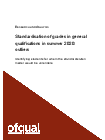Standardisation of grades in general qualifications in summer 2020: outliers

Identifying students for whom the standardisation model would be unreliable.
Documents
Standardisation of grades in general qualifications in summer 2020: outliers
Ref: Ofqual/20/6732PDF, 685KB, 48 pages
This file may not be suitable for users of assistive technology.
Request an accessible format.
If you use assistive technology (such as a screen reader) and need aversion of this document in a more accessible format, please email [email protected].Please tell us what format you need. It will help us if you say what assistive technology you use.

Table 4

Table 5

Table 6

Table 7

Table 8

Table 9

Table 10
Details
We are publishing this work to seek to identify outlying students for who the standardisation process could not be relied upon, in the interests of transparency and so that other researchers can build upon this work. Should any form of statistical standardisation of grades be used in the future, there are lessons to be learned about how best to accommodate unusual students and how best to build confidence in the process
The circumstances surrounding the award of grades in summer 2020 were unprecedented. In response to the cancellation of assessments in GCSE, AS, A level, Extended Project Qualification and Advanced Extension Awards, we put in place arrangements to collect teacher estimates of the grades that students were most likely to have achieved. This information was provided by schools and colleges in the form of centre assessment grades (CAGs), and a rank order of students in each subject, that provided information about their relative expected performance.
The consistency with which this information was generated, and the absolute accuracy of the CAGs submitted, could not be guaranteed. To address any inconsistencies and the likely optimism in the CAGs, a statistical model was implemented to standardise grades across schools and colleges. This was intended to address any advantage or disadvantage to students across the country while also ensuring that national outcomes were broadly maintained. This approach was in line with a direction to Ofqual from the Secretary of State for Education.
Following the issue of standardised A level results, it became apparent that the grades issued did not command public confidence and a great deal of distress was experienced by students, their families, teachers and the wider public. For this we are very sorry. In light of this anguish, we decided to award grades to students that were either the CAGs or the standardised calculated grade, whichever grade was higher.
As with any statistical model, standardisation made assumptions about groups of students. Throughout the development of the standardisation model, ‘outlying students’ were of concern. The term ‘outlier’ is a statistical one. It is used to refer to those students who may be in some way atypical within their centre. For example, they might have a prior attainment profile that makes them quite unique in their centre. This uniqueness might mean that their calculated grade is unreliable. These unusual students were a focus of considerable concern and analysis.
Published 18 December 2020











Responses